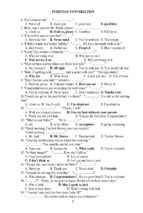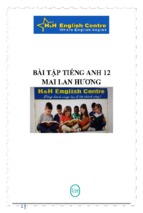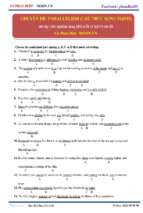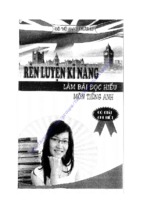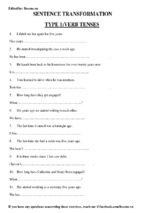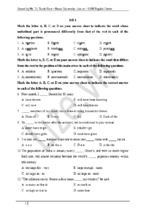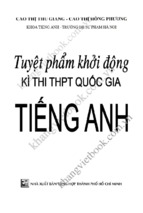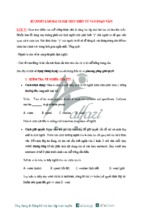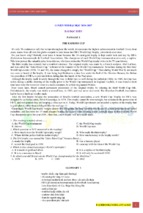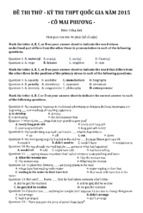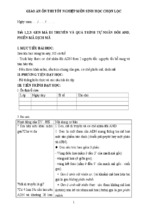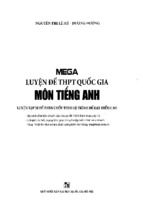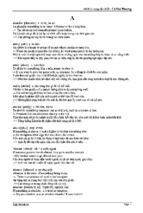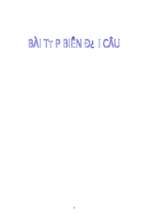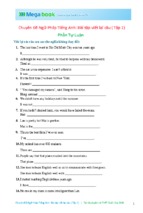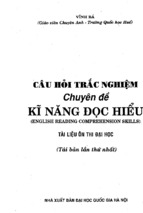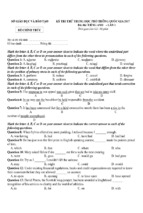ĐỀ THI MẪU TỐT NGHIỆP THPT QUỐC GIA NĂM 2016
ĐƠN VỊ: THPT NGUYỄN TRÃI
Mark the letter A, B, C, or D on your answer sheet to indicate the word whose underlined
part is pronounced differently from that of the rest in each of the following questions.
01.
02.
A. opened
A. cook
B. played
B. fool
C. proved
C. moon
D. regarded
D. tool
Mark the letter A, B, C, or D on your answer sheet to indicate the word that differs from the
rest in the position of the main stress in the following question.
03.
04.
05.
A. reduction
A. discover
A. acceptance
B. popular
B. difficult
B. explorer
C. financial
C. invention
C. possibly
D. romantic
D. important
D. refusal
Mark the letter A, B, C, or D on your answer sheet to indicate the correct answer to each of
the following questions
06. . …………………should children be allowed to drive.
A. Under no circumstances
B. Rather
C. No sooner
D. Than
07. - “More coffee?, Anybody?”
- “ _________________.”
A. I don’t agree, I’m afraid
B. Yes, I’d love to
C. Yes, please
D. It’s right, I think
08. Do you know the woman____ over there?
A. who sit
B. sat
C. sits
D. sitting
09. Since he was a boy, one of his _____ has been stamp collecting
A. cares
B. Professions
C. sports
D. hobbies
10. He is …………………………
A. a nice handsome young man.
B. a man nice handsome young
C. a young handsome nice man
D. a handsome nice young man
11. Their house is much____ than ours.
A. more big
B. bigger
C. big
D. more bigger
12. It was raining, ____ we cancelled the trip to the beach.
A. although
B. so
C. out
D. because
13. She has a deep-rooted ______ in her own ability.
A. bill
B. behaviour
C. beach
D. belief
14. I wasn't properly dressed for the party and felt ___ about my appearance.
A. embarrassment B. embarrass
C. embarrassing
D. embarrassed
15. Hoi An is famous____ its old streets
A. for
B. to
C. about
D. of
16. Advanced students need to be aware of the important of collocation
A. of high level
B. of low level
C. of steady progress
D. of great important
17. I don't know _________ she will be admitted to the university.
A. whether
B. who
C. what
D. which
18. - “Can I use your motorbike this evening?”
- “ _______________”
A. Of course, you can
B. It’s my pleasure
C. Of course, you might
D. Do it if you can
19. I'd rather have wine ____ beer.
A. instead of
B. instead from
C. instead than
D. instead to
20. She's always…………….. promises, but then she always breaks them!
A. taking
B. making
C. having
D. doing
21. My brother stopped____ two years ago.
A. to smoke
B. smoke
C. smoked
D. smoking
22. Erica must ___ gone out. I can't see her.
A. have
B. had
C. has
D. having
23. I am……………. a party at the weekend. Would you like to come?
A. making
B. doing
C. having
D. taking
24. A very nice painting is hung ____ the wall in our classroom
A. at
B. above
C. on
D. over
25. When Newton was 22 years old, he began____ the theory of gravitation
A. study
B. studies
C. studied
D. to study
Mark the letter A, B, C, or D on your answer sheet to indicate the word(s) that is CLOSET in
meaning to the underlined part in each of the following questions.
26. My uncle, who is an accomplished guitarist, taught me how to play.
A. modest
B. famous
C. perfect
D. skillful
27. After many year of unsuccessfully endeavoring to form his own orchestra, Glenn Miller finally
achieved world fame in 1939 as a big band leader.
A. requesting
B. offering
C. trying
D. deciding
28. The most important thing is to keep yourself occupied.
A. free
B. comfortable
C. busy
D. relaxed
29. In rural Midwestern towns of the USA, the decisions that affect most residents are made at general
assemblies in schools and churches.
A. concerts
B. public libraries
C. prayer services
D. gatherings
Mark the letter A, B, C, or D on your answer sheet to show the underlined part that needs
correction in each of the following questions.
30. When I got home, Irene was lying in bed thinking about the wonderful time she has had.
A
B
C
D
31. A catalog of courses and requirements often confuse students.
A
B
C
D
32. Here is the book and the workbook that you will need for this course.
A
B
C
D
33. Each of the students are studying for the test.
A
B
C
D
34. Not only the students but also the teacher are confused by the material.
A
B
C
D
Read the following passage and mark the letter A, B, C, or D on your answer sheet to indicate
the correct word or phrase that best fits each of the numbered blanks.
Teaching English as a foreign language can be a great way to travel the world and earn money at
the same time. However, some graduates actually like the idea of (35) …………… a career in teaching
English long-term, and there are numerous courses at various (36) …………… of teaching, from the
basic certificates to the diploma or even the master’s.
To find the right course a good place to start is TEFL.com – an Internet site with lots of relevant
information and helpful (37) ……………, including a comprehensive list of institutions in the UK
offering TEFL courses. The site also offers a job search facility to assist qualified students (38)
…………… finding work.
When deciding on a course, the best thing to do is to look at what your needs are. If you want a
career in teaching English, the definitely find one designed for that (39) ……………, such as an MA or
diploma; but if you want to travel around the world, then do a shorter course that will supply you with
teaching skills.
Some countries will (40) …………… people without a teaching qualification as (41)
…………… as the teacher is a (42) …………… speaker of English. However, most countries now
(43) …………… a qualification.
It is advisable to make sure that the course that you want to do is recognized and that it includes
a period of teaching practice. This is important in (44) ………… people to be English language
teachers.
35: A. tracking
B. chasing
C. hunting
D. following
36: A. levels
B. categories
C. groups
D. classes
37: A. opinion
B. suggestion
C. advice
D. idea
38: A. to
B. for
C. at
D. in
39: A. function
B. use
C. aim
D. purpose
40: A. occupy
B. work
C. employ
D. staff
41: A. soon
B. far
C. well
D. long
42: A. native
B. resident
C. local
D. national
43: A. insist
B. wait
C. ask
D. expect
44: A. planning
B. preparing
C. practicing
D. organizing
Read the following passage and mark the letter A, B, C or D on your answer sheet to indicate the
correct answer to each of the question s from 45 to 54.
Ancient people made clay pottery because they needed it for their survival. They used the pots
they made for cooking, storing food, and carrying things from place to place. Pottery was so important
to early cultures that scientists now study it to learn more about ancient civilizations. The more
advanced the pottery in terms of decoration, materials, glazes and manufacture, the more advanced the
culture itself.
The artisan who makes pottery in North America today utilizes his or her skill and imagination
to create items that are beautiful as well as functional, transforming something ordinary into something
special and unique.
The potter uses one of the Earth's most basic materials, clay. Clay can be found almost
everywhere. Good pottery clay must be free from all small stones and other hard materials that would
make the potting process difficult. Most North American artisan-potters now purchase commercially
processed clay, but some find the clay they need right in the earth, close to where they work.
The most important tools potters use are their own hand; however, they also use wire loop tools,
wooden modeling tools, plain wire, and sponges. Plain wire is used to cut away the finished pot from
its base on the potter's wheel.
After a finished pot is dried of all its moisture in the open air, it is placed in a kiln and fired. The
first firing hardens the pottery, and it is then ready to be glazed and fired again. For areas where they
do not want any glaze, such as the bottom of the pot, artisans paint on melted wax that will later burn
off in the kiln. They then pour on the liquid glaze and let it run over the clay surface, making any kind
of decorative pattern that they want.
45. It can be inferred from the passage that clay is processed commercially in order to ……….
A. make it easier to color
B. remove hard substances
C. prevent the glaze from sticking
D. make it dry more evenly
46. What does the passage mainly discuss?
A. Different kinds of clay.
B. Crafts of ancient civilizations.
C. The making of pottery.
D. The training of an artisan.
47. According to the passage, which of the following can be learned about an ancient civilization by
examining its pottery?
A. Its population
B. Its developmental stage
C. Its geographic location
D. Its food preferences
48. According to the passage, how do most North American potters today get the clay they need?
A. They buy it
B. They barter for it
C. They did it from the earth
D. They make it
49. The word "basic" in line 7 is closest in meaning to which of the following?
A. Dirty
B. Fundamental
C. Familiar
D. Versatile
50. The word "pattern" in line 15 is closest in meaning to which of the following?
A. Color
B. Model
C. Puzzle
D. Design
51. Which of the following is NOT mentioned in the passage as a way that ancient people used
pottery?
A. To transport objects
B. To wash clothes
C. To hold food
D. To cook
52. According to the author, what do potters use to remove the pot from the wheel?
A. A sponge
B. Melted wax
C. A wire loop
D. Plain wire
53. The word "functional" in line 6 is closest in meaning to which of the following?
A. Useful
B. Inexpensive
C. Strong
D. Original
54. The word "it" in line 2 refers to _____.
A. clay
B. survival
C. culture
D. pottery
Read the following passage and mark the letter A, B, C or D on your answer sheet to indicate the
correct answer to each of the question s from 55 to 64.
The Moon has been worshipped by primitive peoples and has inspired humans to create
everything from lunar calendars to love sonnets, but what do we really know about it? The most
accepted theory about the origin of the Moon is that it was formed of the debris from a massive
collision with the young Earth about 4.6 billion years ago. A huge body, perhaps the size of Mars,
struck the Earth, throwing out an immense amount of debris that coalesced and cooled in orbit around
the Earth.
The development of Earth is inextricably linked to the moon; the Moon's gravitational influence
upon the Earth is the primary cause of ocean tides. In fact, the Moon has more than twice the effect
upon the tides than the Sun does. The Moon makes one rotation and completes a revolution around the
Earth every 27 days, 7 hours, and 43 minutes. This synchronous rotation is caused by an uneven
distribution of mass in the Moon (essentially, it is heavier on one side than the other) and has allowed
the Earth's gravity to keep one side of the Moon permanently facing Earth. It is an average distance
from Earth of 384,403 km.
The Moon has no atmosphere; without an atmosphere, the Moon has nothing to protect it from
meteorite impacts, and thus the surface of the Moon is covered with impact craters, both large and
small. The Moon also has no active tectonic or volcanic activity, so the erosive effects of atmospheric
weathering, tectonic shifts, and volcanic upheavals that tend to erase and reform the Earth's surface
features are not at work on the Moon. In fact, even tiny surface features such as the footprint left by an
astronaut in the lunar soil are likely to last for millions of years, unless obliterated by a chance
meteorite strike. The surface gravity of the Moon is about one-sixth that of the Earth's. Therefore, a
man weighing 82 kilograms on Earth would only weigh 14 kilograms on the Moon.
The geographical features of the Earth most like that of the Moon are, in fact, places such as the
Hawaiian volcanic craters and the huge meteor crater in Arizona. The climate of the Moon is very
unlike either Hawaii or Arizona, however; in fact the temperature on the Moon ranges between 123
degrees C. to -233 degrees C.
55. The word "uneven" is closest in meaning to _____.
A. equally distributed
B. orderly
C. heavier D. not uniform
56. A person on the Moon would weigh less than on the Earth because _____.
A. the Moon has no active tectonic or volcanic activity
B. the surface gravity of the Moon is less
C. of the composition of lunar soil
D. the Moon has no atmosphere
57. According to the passage, the Moon is _____.
A. protected by a dense atmosphere
B. composed of a few active volcanoes
C. older than the Earth
D. the primary cause of Earth's ocean tides
58. Which of the following can be inferred from the passage?
A. The Moon is not able to support human life.
B. People living in Hawaii and Arizona would feel at home on the Moon.
C. If the Moon had no gravitational influence, the Earth would not have tides.
D. Mars could have been formed in a similar way to the Moon.
59. The word "erase" is closest in meaning to _____.
A. change
B. impact
C. obliterate
D. erupt
60. All of the following are true about the Moon EXCEPT _____.
A. it has a wide range of temperatures
B. it is unable to protect itself from meteorite attacks
C. it has less effect upon the tides than the Sun
D. it is heavier on one side than the other
61. The word "massive" is closest in meaning to _____.
A. impressive
B. dense
C. huge
D. unavoidable
62. The word "debris" is closest in meaning to _____.
A. rubbish
B. earth
C. satellites
D. moons
63. Why does the author mention "impact craters"?
A. to show the result of the Moon not having an atmosphere.
B. to explain the corrosive effects of atmospheric weathering.
C. to explain why the Moon has no plant life because of meteorites.
D. to show the result of the Moon not having active tectonic or volcanic activity.
64. What is the passage primarily about?
A. the Moon's effect upon the Earth.
B. a comparison of the Moon and the Earth.
C. the origin of the Moon.
D. what we know about the Moon and its differences to Earth.
WRITING
Part I. Finish each of the following sentences in s uch a way that it means the same as the sentence
printed before it.
65: He is the most generous headmaster I’ve ever worked with.
→ I have never____________________________________________________________
66: No students in my class can speak English as fluently as Lam does.
→ Lam____________________________________________________________________
67: Since our advertisement for our product was so bad, fewer people bought it.
→ Had____________________________________________________________________
68: The workers only called off the strike after a new pay offer.
→ Only after ______________________________________________________________.
69: “You’re always making terrible mistakes,” said the teacher.
The teacher complained______________________________________________________
Part II In about 140 to 150 words, Write a paraghaph to tell about “What are the most important
qualities for a friendship?” You should write at least 80 words.
……………………………………………………………………………………………………………
……………………………………………………………………………………………………………
……………………………………………………………………………………………………………
……………………………………………………………………………………………………………
……………………………………………………………………………………………………………
……………………………………………………………………………………………………………
……………………………………………………………………………………………………………
……………………………………………………………………………………………………………
……………………………………………………………………………………………………………
……………………………………………………………………………………………………………
……………………………………………………………………………………………………………
……………………………………………………………………………………………………………
……………………………………………………………………………………………………………
……………………………………………………………………………………………………………
……………………………………………………………………………………………………………
……………………………………………………………………………………………………………
……………………………………………………………………………………………………………
……………….....
KEY:
1.
2.
3.
4.
5.
6.
7.
8.
9.
D
A
B
B
C
A
C
D
D
10. A
11. B
12. B
13. D
14. D
15. A
16. A
17. A
18. A
19. A
20. B
21. D
22. A
23. C
24. C
25. D
26. D
27. C
28. C
29. D
30. D
31. D
32. A
33. B
34. B
READING 1: 35. D 36. A 37. B 38. D 39. D 40. C 41. D 42. A 43. D 44. B
READING 2: 45. B 46. C 47. B 48. A 49. B 50. D 51. B 52. D 53. A 54. D
READING 3: 55. D 56. B 57. D 58. A 59. C 60. C 61. C 62. A 63. A 64. D
WRITING (2đ)
Part I. Finish each of the following sentences in s uch a way that it means the same as the sentence
printed before it. (0,1 X 5 = 0,5đ)
65: I have never worked with such a more generous headmaster than he is.
66: Lam can speak English the most fluently of all students in my class.
67: Had the advertisement for our product been better, more people would have bought it.
68: Only after a new pay offer did the workers call of the strike.
69: The teacher complained about his/her students making terrible mistakes.
Part II. In about 140 to 150 words, Write a paraghaph to tell about “What are the most
important qualities for a friendship?”You should write at least 80 words. (1.5đ)
1. Nội dung:
- Đúng chủ đề: 0.25đ
- Viết logic , hợp lý: 0,25đ
2. Ngôn ngữ:
- Viết đúng cấu trúc ngữ pháp: 0,25đ
- Sử dụng từ vựng phù hợp và phong phú: 0,25đ
3. trình bày:
- Viết đủ số từ: 0.25đ
- Mạch lạc, rõ rang, có ý sang tạo: 0.25đ
4. Điểm trừ:
- Ngữ pháp: trừ tối đa 0.125đ
- Chính tả: trừ tối đa 0.125đ
- Ít hơn số từ qui định: trừ 0.125đ
A friend is very important to everyone. In fact, it’s impossible to live without friends. In my
opinion, there are three basic qualities that lay the firm foundation for friendship. Firstly, mutual help.
A good friend is always ready to give us a hand in any situations. A friend in need is a friend indeed.
We shouldn’t be too deliberate in helping. Secondly, mutual confidence. Friends must feel safe when
telling each other the most secrets. Obviously, liars and talkative people can never have good friends.
Thirdly, talking about true friendship, I can’t help mentioning the faithfulness and sharing. A true
friend is the one who will cheer to our happiness and share our sorrows in adversity. In short, the
value of friendship is that gives us a source of happiness and comforts our sufferings and a true
friendship will be forever although we are rich or poor.
ĐỀ THI THỬ THPT QUỐC GIA NĂM 2016
ĐƠN VỊ: THPT CHÂU THÀNH 1
Mark the letter A, B, C, or D on your answer sheet to indicate the correct answer to each of the
following questions.
Question 1: Hardly had the car turned round the corner when one of the back wheels ______.
A. broke away
B. turned out
C. came off
D. rolled down
Question 2: Did you apologise to Beth, ______?
A. who you spilt some coffee on her dress
B. you spilt some coffee on her dress
C. whose dress you spilt some coffee
D. whose dress you spilt some coffee on
Question 3: ______ often serve as places of public entertainment and festivals, they can also be
places where people can find peace.
A. Even though city parks
B. City parks which
C. There are city parks which
D. City parks are
Question 4: “Today’s my 18th birthday” – “______.”
A.Take care
B. Have a good time
C. Many happy returns
D. Oh, the older, the sadder
Question 5: The man ______ his invaluable time to redecorating the walls before the coming
festival.
A. spent
B. devoted
C. used
D. confessed
Question 6: Scientists and engineers have invented devices to remove ______ from industrial
wastes.
A. pollutions
B. pollute
C. polluting
D. pollutants
Question 7: Brian is going to see the principal because this is ______.
A. a such serious matter
B. such serious matter
C. so serious a matter
D. so serious matter
Question 8: Throughout history, the moon has inspired not only song and dance ______.
A. and also poetry and prose
B. but poetry also prose
C. together with poetry and prose
D. but poetry and prose as well
Question 9: It was very difficult for his Literature teacher to ______ what he has written.
A. make off
B. make of
C. make up
D. make out
Question 10: ______ I dislike Hollywood films but this was an exception.
A. As a result
B. As far as I know C. As a rule
D. As soon as
Question 11: I was just looking in the shop window when this necklace ______ my eye.
A. drew
B. appealed
C. caught
D. attracted
Question 12: In most ______ developed countries, up to 50% of ______ population enters higher
education at some time in their lives.
A. the/
B. /
C. the/ a
D. /the
Question 13: My teacher was angry with me. I didn’t do all the work I ______ last week.
A. need to have done
B. may have done C. should have done D. must have done
Question 14: In the primary school, a child is in the ______ simple setting.
A. comparison
B. comparative
C. comparatively D. comparable
Question 15: Hardly can we imagine how people rushed to see the first films ______ in the 1930s.
A. to be shown
B. to show
C. be shown
D. showing
Question 16: The boss left instructions, under no circumstances ______ unattended.
A. should leave the office
B. we are to leave the office
C. is the office to be left
D. should the office leave
Question 17: “Oh no, I’m late for my appointment.” – “______.”
A. Catch you later
B. Catch you now C. Please to meet you D. Nice to see you
Question 18: His application was ______ because he is inexperienced and under-qualified.
A. turned on
B. turned out
C. turned in
D. turned down
Question 19: When Peter was a child, there ______ a market near his house.
A. used to be
B. used to have
C. used to be being D. used to have been
Mark the letter A, B, C, or D on your answer sheet to indicate the word that differs from the rest
in the position of the main stress in each of the following questions.
Question 20: A. advisable
B. admirable
C. admissible
D. desirable
Question 21: A. automatic
B. industrial
C. occasional
D. exaggerate
Question 22: A. continuous
B. extinctive
C. particular
D. primitive
Mark the letter A, B, C, or D on your answer sheet to indicate the word whose underlined part is
pronounced differently from that of the rest in each of the following questions.
Question 23: A. degree
B. critical
C. fertile
D. minimun
Question 24: university
B. understand
C. discussion
D. industrial
Mark the letter A, B, C, or D on your answer sheet to show the underlined part that needs
correction in each of the following questions.
Question 25: Despite the terrible traffic, foreign visitors keep coming to the tourist attraction in
A
B
C
large amounts.
D
Question 26: Silver is too soft to use by itself, so it is mixed with another metal to make
A
B
C
themselves harder.
D
Question 27: The brain is made up of billions of neurons that differ with each other
A
B
C
in size and shape
D
Question 28: The bridge was hitting by a large ship during a sudden storm last week.
A
B
C
D
Questions 29: Mary and her sister just bought two new winters coats at the clearance sale
A
B
C
D
Mark the letter A, B, C, or D on your answer sheet to indicate the word or phrase that is
CLOSEST in meaning to the underlined part in each of the following questions.
Question 30: Changing the departure time would have entailed getting up two hours earlier.
A. resulted from
B. led to
C. came out
D. brought in
Question 31: The current economic crisis should be regarded as a warning not to be overconfident
in the market.
A. depression
B. inflation
C. redundancy
D. shortage
Question 32: He was sacked on the spot because he showed his shortage of the basic knowledge.
A. enrolled
B. recalled
C. dismissed
D. relieved
Mark the letter A, B, C, or D on your answer sheet to indicate the word or phrase that is
OPPOSITE in meaning to the underlined part in each of the following questions.
Question 33: He is interested in voluntary activities designed by Youth Union Organization.
A. obligatory
B. desired
C. ambitious
D. willing
Question 34: Candidates can leave out insignificant information to avoid being confused when
reading the instructions.
A. reasonable
B. believable
C. intentional
D. major
Read the following passage and mark the letter A, B, C, or D on your answer sheet to indicate
the correct answer to each of the questions from 35 to 44.
Butterflies are among the most extensively studied insects – an estimated 90 percent of the
world’s species have scientific names. As a consequence, they are perhaps the best group of insects
for examining patterns of terrestrial biotic diversity and distribution. Butterflies also have a favorable
image with the general public. Hence, they are an excellent group for communicating information on
science and conservation issues such as diversity.
Perhaps the aspect of butterfly diversity that has received the most attention over the past
century is the striking difference in species richness between tropical and temperate regions.
For example, in 1875, one biologist pointed out the diversity of butterflies in the Amazon
when he mentioned that about 700 species were found within an hour’s walk, whereas the total
number found on the British islands did not exceed 66, and the whole of Europe supported only 321.
This early comparison of tropical and temperate butterfly richness has been well confirmed.
A general theory of diversity would have to predict not only this difference between
temperate and tropical zones, but also patterns within each region, and how these patterns vary
among different animal and plant groups. However, for butterflies, variation of species richness
within temperate and tropical regions is poorly understood. Indeed, comparisons of numbers of
species among the Amazon basin, tropical Asia, and Africa are still mostly “personal
communication” citations, even for vertebrates. In other words, unlike comparison temperate and
tropical areas, these patterns are still in the documentation phase.
In documenting geographical variation in butterfly diversity, some arbitrary, practical
decisions are made. Diversity, number of species, and species richness are used synonymously; little
is known about the evenness of butterfly distribution. The New World butterflies make up the
preponderance of examples because they are the most familiar species. It is hoped that by focusing
on them, the errors generated by imperfect and incomplete taxonomy will be minimized.
Question 35. The word “consequence” in paragraph 1 is closest in meaning to
.
A. result
B. explanation
C. analysis
D. requirement
Question 36. The word “striking” in paragraph 2 is closest in meaning to
.
A. physical
B. confusing
C. noticeable
D. successful
Question 37. Butterflies are a good example for communicating information about conservation
issues because they
.
A. are simple in structure
B. have been given scientific names
C. are viewed positively by people
D. are found mainly in temperate climates.
Question 38. The word “exceed” in paragraph 3 is closest in meaning to
.
A. locate
B. allow
C. go beyond
D. come close to
Question 39. What is the most distinguishing feature of butterfly diversity in the past century?
A. Numerous patterns of terrestrial biotic diversity and distribution.
B. Comparisons of behavior patterns of butterflies and certain animal groups.
C. The striking difference in species richness between tropical and temperate regions.
D. The documentation phase of the process.
Question 40. Which of the following is NOT well understood by biologists?
A. European butterfly habitats.
B. Differences in species richness between temperate and tropical regions.
C. Differences in species richness within a temperate or a tropical region.
D. Comparisons of behavior patterns of butterflies and certain animal groups.
Question 41. All of the following are mentioned as being important parts of a general theory of
diversity EXCEPT
.
A. differences between temperate and tropical zones.
B. patterns of distribution of species in each region.
C. migration among temperate and tropical zones.
D. variation of patterns of distribution of species among different animal and plants.
Question 42. Which aspect of butterflies does the passage mainly discuss?
A. Their physical characteristics.
B. Their adaptation to different habitats
C. Their names
D. Their variety
Question 43. The author mentions “tropical Asia” in paragraph 3 as an example of a location where
.
A. butterfly behavior varies with climate
B. a general theory of butterfly diversity has not yet been firmly established
C. butterflies are affected by human populations
D. documenting plant species is more difficult than documenting butterfly species
Question 44. The word “generated” in paragraph 5 is closest in meaning to
.
A. requested
B. caused
C. assisted
D. estimated
Read the following passage and mark the letter A, B, C, or D on your answer sheet to indicate
the correct answer to each of the questions from 45 to 54
For more than six million American children, coming home after school means coming back
to an empty house. Some deal with the situation by watching TV. Some may hide. But all of them
have something in common. They spend part of each day alone. They are called “latchkey
children”. They are children who look after themselves while their parents work. And their bad
condition has become a subject of concern.
Lynette Long was once the principal of an elementary school. She said, “we had a school rule
against wearing jewelry. A lot of kids had chains around their necks with keys attached. I was
constantly telling them to put the keys inside shirts. There were so many keys; it never came to my
mind what they meant.” Slowly, she learned that they were house keys.
She and her husband began talking to the children who had keys. They learned of the effect
working couples and single parents were having on their children. Fear wasthe biggest problem
faced by children at home alone. One in three latchkey children the Longs talked to reported being
frightened. Many had nightmares and were worried about their own safety
The most common way latchkey children deal with their fears is by hiding. They may hide in
a shower stall, under a bed or in a closet. The second is TV. They often turn the volume up. It’s hard
to get statistics on latchkey children, the Longs have learned. Most parents are slow to admit that
they leave their children alone.
Question 45. The phrase “an empty house” in the passage mostly means
.
A. a house with too much space
B. a house with no furniture
C. a house with no people inside
D. a house with nothing inside
Question 46. One thing that the children in the passage share is that
.
A. they all wear jewelry
B. they spend part of each day alone
C. they all watch TV
D. they are from single-parent families
Question 47. The phrase “latchkey children” in the passage means children who
A. like to carry latches and keys with them everywhere
B. close doors with keys and watch TV by themselves
C. look after themselves while their parents are not at home
D. are locked inside houses with latches and keys
.
Question 48. The main problem of latchkey children is that they
.
A. are growing in numbers
B. watch too much television during the day
C. are also found in middle-class families
D. suffer a lot from being left alone
Question 49. What is the main idea of the first paragraph?
A. Why kids hate going home
B. Children’s activities at home
C. Bad condition of latchkey children
D. How kids spend free time
Question 50. Why did a lot of kids have chains around their necks with keys attached?
A. They were fully grown and had become independent.
B. They had to use the keys to open school doors.
C. Schools didn’t allow them to wear jewelry, so they wore keys instead.
D. They would use the keys to enter their houses when they came home.
Question 51. What do latchkey children suffer most from when they are at home alone?
A. Tiredness
B. Boredom
C. Loneliness
D. Fear
Question 52. Lynette Long learned of latchkey children’s problems by
.
A. visiting their homes
B. talking to them
C. delivering questionaires
D. interviewing their parents
Question 53. What is the most common way for latchkey children to deal with fears?
A. Talking to the Longs
B. Having a shower
C. Hiding somewhere
D. Lying under a TV
Question 54. It’s difficult to find out the number of latchkey children because
.
A. there are too many of them in the whole country
B. most parents are reluctant to admit that they leave their children alone
C. they hide themselves in shower stalls or under beds
D. they do not give information about themselves for safety reasons
Read the following passage and mark the letter A, B, C, or D on your answer sheet to
indicate the correct word for each of the blanks from 55 to 64.
Set in the red desert of the central Australia in the mining town of the Coober Pedy. At first
sight, the town looks similar to many other such communities, but Coober Pedy is different. Sixty
percent of its population is some 4,000 people living underground. There are today about 800
underground houses as well as shops, hotels and even churches in the town and the (55)
hills.
Once a site has been chosen, special tunneling machines are (56)
in to create passages and
rooms in the sandstone. Rock pillars are left to (57)
the roof, and doors and windows are cut
into the front. Houses are of all shapes and (58)
, the largest has twenty rooms, and some even
have their own swimming pool.
Living underground may sound strange but in fact it has a number of advantages. In summer,
the temperature outside can reach an astonishing 47 degrees Celsius, and in winter the night can be
(59)
cold. However, inside the house it remains a steady 25 degrees Celsius all year (60)
. Many people say that living underground makes them feel very secure. There is no problem with
noise from the neighbors and the houses are not (61)
by the fierce dust storms that regularly
(62)
through the area. And of course, if your family (63)
or lots of friends come to
stay, you can (64)
dig another room.
Question 55. A. near
Question 56. A. brought
Question 57. A. lift
Question 58. A. sizes
B. enclosing
B. entered
B. support
B. areas
C. close
C. placed
C. push
C. volumes
D. surrounding
D. worked
D. rise
D. numbers
Question 59. A. strongly
Question 60. A. along
Question 61. A. spoiled
Question 62. A. pour
Question 63. A. grows
Question 64. A. only
B. heavily
B. round
B. disturbed
B. sweep
B. rises
B. always
C. extremely
C. across
C. influenced
C. flood
C. stretches
C. regularly
D. sharply
D. wide
D. affected
D. hurry
D. explodes
D. ever
WRITING
Part I. Finish each of the following sentences in such a way that it means the same as the
sentence printed before it.
Question 65: Trang didn’t know how to solve the problem so she got poor marks
If ........................................................................................................................
Question 66: She started loving him 2 years ago
She fell ..............................................................................................................
Question 67: The boy is too young to understand the problem
The boy isn’t .....................................................................................................
Question 68: No student in my class can run as fast as Jack
Jack is ................................................................................................................
Question 69: The children like to walk in the rain
The children enjoy ............................................................................................
Part II. In about 120 words, write a paragraph to describe a popular celebration in Vietnam that
you like best
KEY:
1. C
2. D
3. A
4. C
5. B
6. D
7. C
8. D
9. D
10. C
11. C
12. D
13. C
14. C
15. A
16. C
17. A
18. D
19. A
20. B
21. A
22. D
23. C
24. A
25. D
26. D
27. C
28. A
29. C
30. B
31. A
32. C
33. A
34. D
35. A
36. C
37. C
38. C
39. A
40. B
41. C
42. D
43. B
44. B
45. C
46. B
47. C
48. D
49. C
50. D
51. D
52. B
53. C
54. B
55. D
56. A
57. B
58. A
59. C
60. B
61. D
62. B
63. A
64. B
WRITING
65. If Trang had known how to solve the problem, she wouldn’t have got poor marks
66. She fell in love with him 2 years ago
67. The boy isn’t old enough to understand the problem
68. Jack is the fastest runner in my class
69. The children enjoy walking in the rain
ĐỀ THI MẪU SỐ 1 - KỲ THI THPT QUỐC GIA NĂM 2016 (THPT NGUYỄN DU)
Môn: Tiếng Anh
Thời gian làm bài: 90 phút.
Mark the letter A, B, C, or D on your answer sheet to indicate the word whose underlined part is
pronounced differently from that of the rest in each of the following questions
Question 1: A. Centered
B. rugged
C. hatred
D. sacred
Question 2: A. plough
B. laugh
C. rough
D. cough
Mark the letter A, B, C, or D on your answer sheet to indicate the word that differs from the rest in the
position of the main stress in the following question.
Question 3: A. memorial
B. memorable
C. memoir
D. memorize
Question 4: A. extremity
B. example
C. exercise
D. Existence
Question 5: A. computer
B. competent
C. competitor
D. commuter
Mark the letter A, B, C, or D on your answer sheet to indicate the correct answer to each of the
following questions.
Question 6: They got lost in the forest, and_________made matters was that night began to fall.
A. that
B. what
C. which
D. it
Question 7: We drove our car_______the store.
A. to
B. on
C. into
D. at
Question 8: The Lake District,_______was made a national parl in 1951, attracts a large number of
tourists every year.
A. which
B. that
C. where
D. what
th
Question 9: Computer is one of the most important______of the 20 century.
A. inventings
B. inventories
C. inventions
D. inventors
Question10: If they are not careful with their accounts, their business will go________
A. poor
B. bankrupt
C. penniless
D. broken
Question 11: “Would you mind lending me your bike?”-“___________”
A. Yes, let’s
B. Yes. Here it is C. Great
D. Not at all
Question 12: “I can’t speak English well enough to apply for that post”-“_____________”
A. Me neither
B. Me too
C. Me etheir
D. Me also
Question 13: He always___________the crossword in the newspaper before breakfast.
A. writes
B. makes
C. works
D. does
Question 14: The youths nowadays have many things to do in their___________time.
A. leisure
B. entertaiment
C. fun
D. amusement
Question 15: An excellent hairstylist can make a man seem to have more hair__________.
A. as has actually me
B. than he actually has
C. than it actually is
D. as is it actually
Question 16: Yesterday my mother bought____________
A. Italian some beautiful cotton hats
B. some hats beautiful Italian cotton
C. some beautiful Italian cotton hats
D. beautiful Italian some cotton hats
Question 17: Why is everybody_____________him all the time?
A. criticizing
B. criticize
C. critical
D. criticism
Question18: “Can you_____________me a favor, Bill?” Peter said.
A. put
B. do
C. make
D. get
Question 19: The police are going to look____________the disappearance of the child.
A. around
B. into
C. through
D. after
Question 20: That cannot be a true story. He _________it up.
A. can have made
B. must have made
C. would have made
D. should have made
Question 21: Parts of the country are suffering water___________after the unusually dry summer.
A. shortage
B. supply
C. thirst
D. hunger
Question 22: College students are becoming less dependent__________their teachers.
A. on
B. with
C. of
D. to
Question 23: Switch off all the lights____________
A. by the time you enter the room
B. until you enter the room
C. after you will leave the room
D. before you leave the room
Question 24: _____________that she does not want to stay any longer.
A. A little homesick does Beth feel
B. Beth feels such homesick
C. Homesick though Beth may feel
D. So homesick does Beth feel
Mark the letter A, B, C, or D on your answer sheet to indicate the word(s) that is CLOSET in meaning
to the underlined part in each of the following questions.
Question 25: My mom is always bad-tempered when I leave my room untidy
A. feeling embarrassed
B. talking too much
C. very happy and satisfied
D. easily annoyed or irritated
Question 26: During the earthquake, a lot of buildings collapsed, which killed thousands of people
A. went off accidentally
B. fell down unexpectedly
C. exploded suddenly
D. erupted violently
Question 27: We really appreciate your help, without which we couldn’t have got our task done in time
A. feel thankful for
B. depreciate
C. require
D. are proud of
Mark the letter A, B, C, or D on your answer sheet to indicate the word or phrase that is OPPOSITE
in meaning to the underlined part in each of the following questions.
Question 28: His boss has had enough of his impudence, and doesn’t want to hire him any more
A. respect
B. rudeness
C. obedience
D. agreement
Question 29: The consequences of the typhoon were disastrous due to the lack of precautionary
measures.
A.physical
B. severe
C. beneficial
D. damaging
Mark the letter A, B, C or D on answer sheet to indicate the underlined part that
needs correction in each of the following questions.
Question 30: He average adult get two to five colds each year.
A
B
C
D
Question 31: Moby Dick is a novel that telling the story of a ship captain’s single- minded
A
B
C
hatred of a huge white whale.
D
Question 32: Some jellyfish make daily journeys from deep surface and back, while other
A
B
C
migrate horizontal.
D
Question 33: Items of luggage whose weight exceed 50 kilograms will not be allowed on the ferry.
A
B
C
D
Question 34: The woman of whom the red car is parked in front of the bank is a famous pop star
A
B
C
D
Read the following passage and mark the letter A, B, C or D on your answer sheet to indicate the
correct answer word or phrase that best fits each of the numbered blanks
Children in (35) _____ Netherlands must be at least four years old to (36) _____ primary education.
Almost all 4-year-olds (99.3%) in the country indeed attend primary school, (37) _____ this is not
compulsory until children reach the age (38) _____ 5. Primary school is free of charge. In most schools,
children are grouped by (39) _____ in mixed ability classes, with one teacher for all subjects. Primary
school (40) _____ of 8 groups, thus schooling (41) _____ for 8 years. During the first two years, which
(42) _____ kindergarten, children receive an average of 22 hours of (43) _____, during the last 6 years
children receive an average of 25 hours per week. Schools are open 5 days a week, but children are free
on Wednesday afternoon. At the end of primary school, or in group 8, schools advice on secondary
school choice. Most schools use a national test to support this advice, for instance the 'Citotoets’, a test
(44) ____ by the Central Institute for Test development.
35.
a. a
b. an
c. the
d. Ø
36.
a. afford
b. enter
c. come
d. run
37.
a. although
b. despite
c. in spite
d. due to
38.
a. of
b. on
c. in
d. for
39.
a. old
b. elderly
c. aging
d. age
40.
a. includes
b. contains
c. consists
d. composes
41.
a. spends
b. lasts
c. lengthens
d. takes
42.
a. also called
b. is also called
c. is called also
d. is also calling
43.
a. educate
b. educative
c. educator
d. education
44.
a. develop
b. to develop
c. developed
d. developing
Read the text and choose the best answer (A, B, C or D) to each of the questions
Family Life in the United States
Family life in the United States is changing. Thirty or forty years ago, the wife was called a
“housewife”. She cleaned, cooked, and cared for the children. The husband earned the money for the
family. He was usually out working all day. He came home tired in the evening, so he did not do much
housework. And he did not see the children very much, except on weekends.
These days, however, more and more wemen work outside the home. They cannot stay with the
children all day. Thet, too, come home tired in the evening. They do not wnt to spend the evening
cooking dinner and cleaning up. They do not have time to clean the house and do the laundry. So who is
going to do the housework now? Who is going to take care of the children?
Many families solve the problem of housework by sharing it. In these families, the husband and wife
agree to do different jobs around the house, or they take turns doing each job. For example, the husband
always cooks dinner and the wife always does the laundry. Or the wife cooks dinner on some nights and
the husband cooks dinner on other nights.
Then there is a question of the children. In the past, many Fmilies got help with child care from
grandparents. Noe families usually do not live near their relatives. The grandparents often are to far away
to help in a regular way.
More often, parents have to pay for child care help. The help may be a babysister or a day-care center.
The problem with thjis kind of help is the high cost. It is possible only for couples with jobs that pay
well.
Parents may get another kind of help from the companies they work for. Many companies now let
people with children work part-time. That way, parents can spend more time with their children. Some
husbands may even stop working for a while to stay with the children. For these men there is a new
word: They are called “househusband”. In the United States more ans more men are becoming
househusband every year.
Tahese changes in the home mean changes in the family. Fathers can learn to understand their
children better, and the children can get to know their fathers better. Husbands and wives may also find
changes in their marriage. They, too, may have a better understanding of each other.
45. This article is about ____________________
A. housewives in America.
B. American men as househusbands.
C. how more American women are working.
D. how family life in America is changing.
46. Forty years ago, most women ____________________
A. had no children
B. worked
C. were not housewives
D. were housewives
47. In those days, men _______________________
A. did not see their children very much
B. spent a lot of time with their children
C. worked with the children all day
D. never saw the children
48. Today there are ________________________
A. more housewives
B. more women working outside the home
C. not as many women working
D. no jobs for women
49. The word “ laundry” in paragraph 2 is closest in meaning to _____________
A. place where clothes are washed
B. washing and ironing
C. shopping
D. cooking and washing up
50. Day-care centers help __________________
A. working parents with their children
B. housewives
C. with cooking and cleaning
D. men become househusband
51. Some parents work part-time _________________
A. so they can be with their children
B. so they can earn more money
C. because they have no time
B. because they do not like their work
52. The word “ they” in paragraph 6 refers to _______________
A. parents who work part-time
B. grandparents
C. fathers who spend more time with their children
D. husbands who stop working to stay with the children
53. Househusbands ________________
A. earn a lot of money
B. do not do any housework
C. do the housework and take care of the children D. marry housewives
54. These changes in the Amercan home may ______________
A. not change the children at all
B. cause problems for a marriage
C. not happen
D. help families
Read the following passage, and mark the letter A, B, C, or D on your answer sheet to indicate the
correct answer to each of the questions from 45 to 54.
Reading to oneself is a modern activity which was almost unknown to the scholars of the classical
and medieval worlds, while during the fifteenth century the term “reading” undoubtedly meant reading
aloud. Only during the nineteenth century did silent reading become commonplace. One should be wary,
however, of assuming that silent reading came about simply because reading aloud was a distraction to
others. Examinations of factors related to the historical development of silent reading have revealed that
it became the usual mode of reading for most adults mainly because the tasks themselves changed in
character. The last century saw a steady gradual increase in literacy and thus in the number of readers. As
the number of readers increased, the number of potential listeners declined and thus there was some
reduction in the need to read aloud. As reading for the benefit of listeners grew less common, so came
the flourishing of reading as a private activity in such public places as libraries, railway carriages and
offices, where reading aloud would cause distraction to other readers. Towards the end of the century,
there was still considerable argument over whether books should be used for information or treated
respectfully and over whether the reading of materials such as newspapers was in some way mentally
weakening. Indeed, this argument remains with us still in education. However, whatever its virtues, the
old shared literacy culture had gone and was replaced by the printed mass media on the one hand and by
books and periodicals for a specialised readership on the other. By the end of the twentieth century,
students were being recommended to adopt attitudes to books and to use reading skills which were
inappropriate, if not impossible, for the oral reader. The social, cultural and technological changes in
the century had greatly altered what the term “reading” implied.
Question 55: Reading aloud was more common in the medieval world because ______.
A. people relied on reading for entertainment
B. silent reading had not been discovered
C. there were few places available for private reading
D. few people could read to themselves
Question 56: The word “commonplace” in the first paragraph mostly means “______”.
A. for everybody’s use
B. most preferable
C. attracting attention
D. widely used
Question 57: The development of silent reading during the last century indicated ______.
A. an increase in the average age of readers
B. an increase in the number of books
C. a change in the nature of reading
D. a change in the status of literate people
Question 58: Silent reading, especially in public places, flourished mainly because of ______.
A. the decreasing need to read aloud
B. the development of libraries
C. the increase in literacy
D. the decreasing number of listeners
Question 59: It can be inferred that the emergence of the mass media and specialised reading materials
was an indication of ______.
A. a decline of standards of literacy
B. a change in the readers’ interest
C. an alteration in educationalists’ attitudes
D. an improvement of printing techniques
Question 60: The phrase “a specialised readership” in paragraph 4 mostly means “______”.
A. a requirement for readers in a particular area of knowledge
B. a limited number of readers in a particular area of knowledge
C. a reading volume for particular professionals
D. a status for readers specialised in mass media
Question 61: The phrase “oral reader” in the last paragraph mostly means “a person who ______”.
A. is good at public speaking
B. practises reading to an audience
C. takes part in an audition
D. is interested in spoken language
Question 62: All might be the factors that affected the continuation of the old shared literacy culture
EXCEPT _____.
A. the inappropriate reading skills
B. the specialised readership
C. the diversity of reading materials
D. the printed mass media
Question 63: Which of the following statements is NOT TRUE according to the passage?
A. Reading aloud was more common in the past than it is today.
B. Not all printed mass media was appropriate for reading aloud.
C. The decline of reading aloud was wholly due to its distracting effect.
D. The change in reading habits was partly due to the social, cultural and technological changes.
Question 64: The writer of this passage is attempting to ______.
A. explain how reading habits have developed
B. change people’s attitudes to reading
C. show how reading methods have improved
D. encourage the growth of reading
Writing
I. Finish each of the following sentences in such a way that it is as similar as possible in meaning to
the sentence printed before it.
65. As I get older, I want to travel less.
(The older _____________________________________________________
66. A house in that district will cost you at least $ 100,000.
(You won’t be able ______________________________________________
67. The salesman told me that my new car would be delivered next Wednesday.
(According ____________________________________________________
68. Everyone started complaining the moment the announcement was made.
(No sooner ____________________________________________________
69. Alan worked too hard at the office, and this led to his illness.
(Alan’s illness __________________________________________________
II. Paragraph writing:
Computers have become increasingly important and popular in Vietnam nowadays. Could
you describe some useful ways in which computers have so far contributed to our modern life?
Write a paragraph about 150 words to express your idea.
- Xem thêm -

